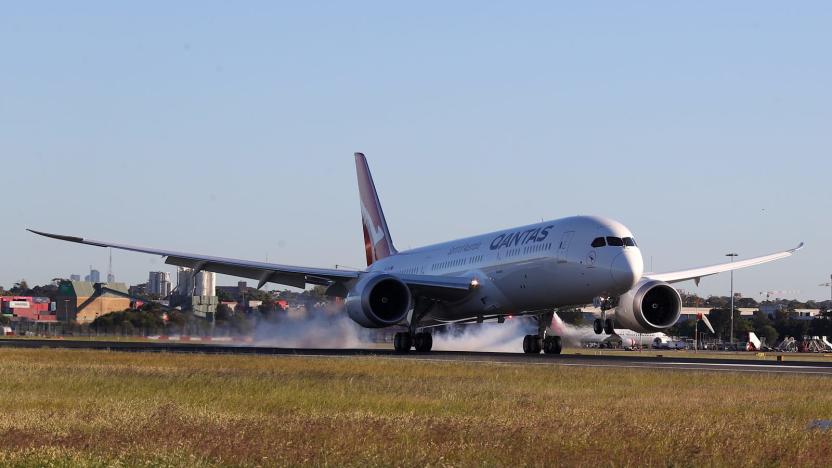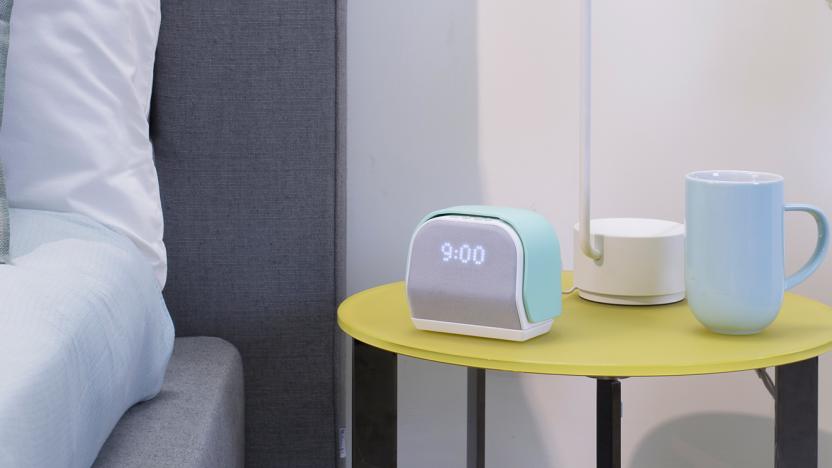jetlag
Latest

Qantas completes record 19-hour flight to test limits of air travel
Qantas just broke a record for air travel, and it may have helped science in the process. The Australian airline has completed the first non-stop commercial flight from New York City to Sydney as part of a project researching the effects of very long flights -- in this case, 19 hours and 16 minutes. The study measured pilots' brain waves, melatonin and overall alertness, while passengers helped gauge the effectiveness of anti-jetlag measures like changes to cabin lighting and meals. Travelers even participated in exercises to keep their bodies limber.

Kello trains your sleeping habits without using sensors
While there are already a handful of devices that claim to improve our sleep quality, one little startup from Hong Kong's Brinc IoT accelerator thinks that it can do a better job. Kello is a sleep trainer that comes in the form of an internet radio alarm slash Bluetooth speaker slash home automation hub, and unlike some of the competition, it doesn't use any bed sensor, clip-on device nor wearable to track the user's sleep activity. Instead, it's all about leveraging "simple, effective and scientifically proven techniques" from specialists to help us sleep faster, wake up better and ultimately change our lifestyle.

IRL: How the University of Michigan failed to cure my jetlag
I'm not complaining about my life, but one of the downsides of international travel is that it's an in-and-out process. That means I land, scratch together a few hours of fitful sleep and then dive head-first into the breakneck pace of covering a trade show. By the time I've adapted to a new time zone, it's time to pack up and go home. That's why an app called Entrain from the University of Michigan was such an exciting prospect, since it promised to help my circadian rhythms resume normal operation in record time and hopefully make those first few days a little less painful

Re-Timer could play with your brain, fool body clock to minimize jetlag
Jetlag and disrupted sleep patterns are conditions we're all too familiar with, right along with flashing lights that claim to remedy them. A new wearable device, tagged Re-Timer, also promises to be of help by mimicking sunlight and resetting the body clock. Reportedly the result of 25 years of sleep research at Australia's Flinders University, it's worn like a pair of glasses and emits soft green light, fooling the part of the brain that regulates your circadian rhythms. When used at different times of the day for specified durations, it claims to advance or delay the clock as desired -- countering the effects of frequent air travel and improving alertness levels. The rechargeable, portable device is safer and more effective than medication, according to its chief inventor Professor Leon Lack. If nothing else, the $260 visor is a bold fashion statement, although it may not be as cool as having robots convert your dreams into art.

Airbus files patent for jetlag zapper
Airbus, that robot-friendly aeroplane company, has filed a patent for a device that generates "electromagnetic interaction in an airplane". No, this isn't some kind of revolutionary fly-by-magnets technology, it's actually a slightly oddball idea intended to solve the most common of airborne travel ailments: jetlag. The device, which in the event that it is ever put into service, will be integrated into passenger seats, supposedly has the capability to "prevent and reduce the occurrence of jetlag, reduce the danger of passengers suffering from thrombosis, and increase general well-being by promoting relaxation, sleep and stress reduction". Ever seen those stone magnets that people put around their wrists to "increase blood flow?" This device looks like it would operate the same away, but in an electromagnetic form. We won't question the validity of using magnets to keep people healthy, but we are puzzled at the logic behind introducing randomly fluctuating electromagnetic fields onto packed airplanes. Surely (don't call me Shirley!) the thought that this could potentially interfere with the pilot's ability to fly the plane crossed the minds of the researchers over at Airbus? Especially considering the common "please turn off your cellphones" announcement that pilots make at the beginning of every flight (FYI, cellphones emit electromagnetic fields). Maybe a wiser course of action would be to focus on cheaper in-flight Wi-Fi, keeping passengers' minds off the fact that they're floating round a tin can far above the world, resulting in less stress and therefore, by Airbus's own logic, reduced jetlag.



